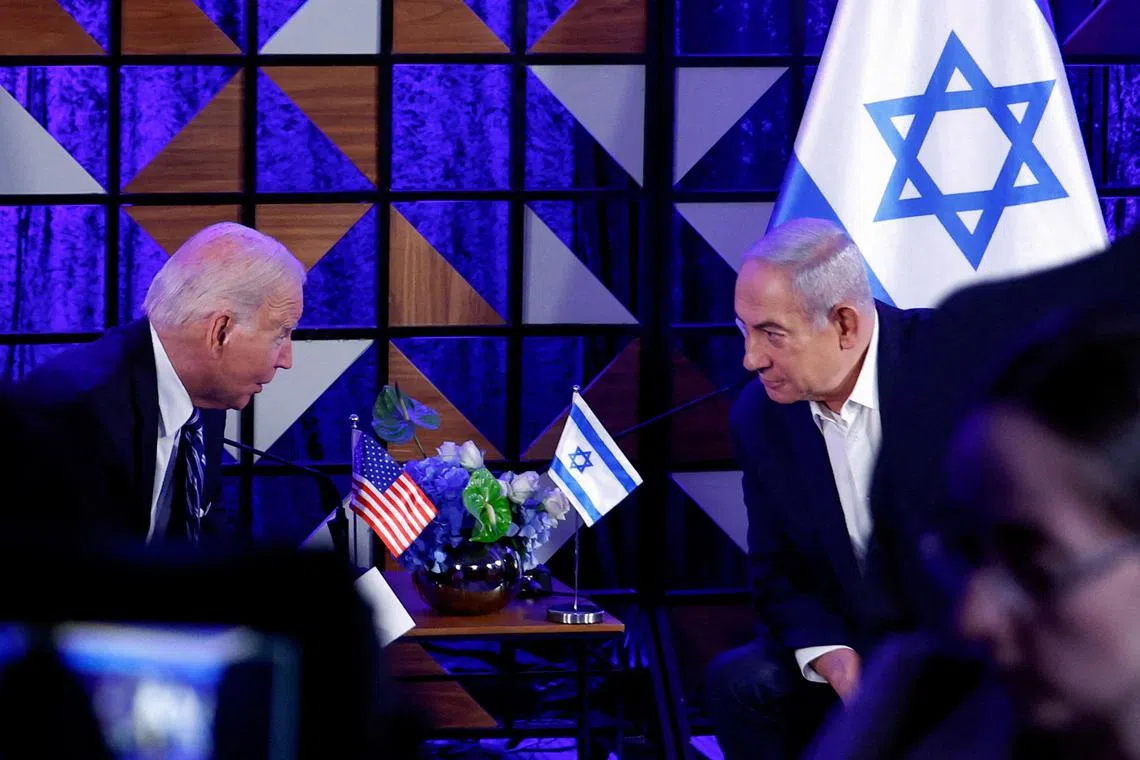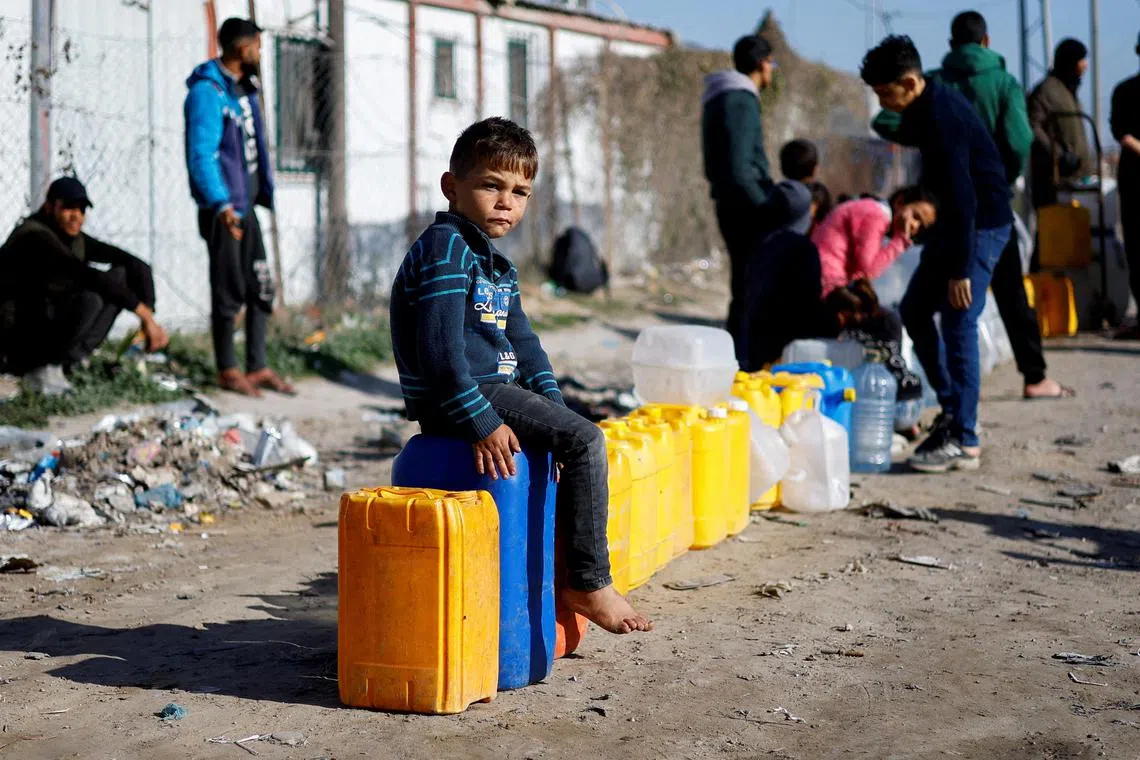Biden says Palestinian state still possible after Netanyahu call
Sign up now: Get ST's newsletters delivered to your inbox

US President Joe Biden (left) in a meeting with Israeli Prime Minister Benjamin Netanyahu during a visit to Tel Aviv in October 2023.
PHOTO: REUTERS
WASHINGTON - United States President Joe Biden said on Jan 19 it was still possible Israeli Prime Minister Benjamin Netanyahu could agree to some form of Palestinian state, after the two leaders spoke for the first time in nearly a month amid tensions over the Gaza war
Their call came a day after Mr Netanyahu said he opposes allowing Palestinian sovereignty in the wake of the conflict with Hamas, deepening Israeli divisions with key backer Washington over the conduct of Israel’s offensive and what comes next.
But Mr Biden said after the call that it was not impossible Mr Netanyahu might come round to some form of so-called two-state solution, mooted for decades as a way to end tensions in the Middle East, despite the Israeli premier’s comments.
“There are a number of types of two-state solutions. There are a number of countries that are members of the UN that... don’t have their own militaries,” Mr Biden told reporters after an event at the White House. “And so, I think there are ways in which this could work.”
Asked what Mr Netanyahu was open to, Mr Biden replied: “I’ll let you know.”
Mr Netanyahu’s office, however, issued a statement on Jan 20 to reiterate Israel’s position.
“In his conversation with President Biden, Prime Minister Netanyahu reiterated his policy that after Hamas is destroyed, Israel must retain security control over Gaza to ensure that Gaza will no longer pose a threat to Israel, a requirement that contradicts the demand for Palestinian sovereignty,” the statement read.
Mr Biden and Mr Netanyahu, who have a complicated relationship stretching back some 40 years, last spoke on Dec 23. The silence between them since has led to repeated questions about a rift.
Mr Netanyahu has pledged to destroy Hamas and demilitarise Gaza following the Oct 7 attacks on Israel, and is increasingly resistant to US pressure for a plan that includes any form of Palestinian statehood that could threaten his country.
The Israeli premier said on Jan 18 that his country “must have security control over all the territory west of the Jordan (River)” and that he had made this clear to Israel’s “American friends”.
“This is a necessary condition, and it conflicts with the idea of (Palestinian) sovereignty,” Mr Netanyahu said in public remarks.
‘Promise and possibility’
The White House said earlier that Mr Biden had pushed the issue with Mr Netanyahu when they spoke, but said the call had not been in direct response to the Israeli premier’s comments.
“The president still believes in the promise and the possibility of a two-state solution” for both Israelis and Palestinians, US National Security Council spokesman John Kirby told reporters.

A displaced Palestinian boy, who fled his house due to Israeli strikes, sitting on a water canister at a tent camp in Rafah, in the southern Gaza Strip.
PHOTO: REUTERS
The call also discussed US hostages still among those held captive by Hamas since the Oct 7 attack on Israel
Mr Biden and Mr Netanyahu have often been at loggerheads in the past, with the Democratic US president in 2023 pressing the right-wing Israeli premier over controversial judicial reforms.
But Mr Biden has stood firmly behind Israel since Oct 7, even travelling to the country after the attacks, where he publicly embraced Mr Netanyahu and pledged full US support.
Fresh tensions have emerged since then, however, as the toll of the Israeli offensive on Gaza has mounted. Mr Biden has warned that Israel could lose support by “indiscriminate bombing”, and has pushed for a two-state solution.
Israel pounded targets across Gaza on Jan 20, while its planes dropped leaflets on the southern area of Rafah urging Palestinians seeking refuge there to help locate hostages held by Hamas.
Palestinian fighters battled tanks trying to push back into the eastern suburbs of the Jabalia area in northern Gaza, where Israel had started pulling out troops and shifting to smaller-scale operations.
The Israeli military said aircraft struck militant squads trying to plant explosives near troops and fire missiles at tanks in northern Gaza, and said it was striking targets throughout Gaza.
In the southern area of Khan Younis, where Israel says it has expanded its operations against Hamas, witnesses said tanks shelled areas around Nasser Hospital overnight, describing the bombardment as the most intense in many days.
Nasser is now Gaza’s largest functioning hospital. Israel says Hamas fighters operate from in and around hospitals, including Nasser. Hamas and medical staff have denied this, though Israel has presented some footage and photos backing its claims.
The Israeli military said it raided a military compound in Khan Younis, neutralised ready-to-use rocket launchers and found explosives stashed underground while an aircraft struck two gunmen there.
The Gaza health ministry said Israeli strikes have killed 165 people and wounded 280 others in the past 24 hours, one of the biggest death tolls in a single day in 2024.
It did not distinguish between combatants and non-combatants in its daily toll. But most of the 24,927 Palestinians killed since the Oct 7 war began are civilians, health officials said.
Fighting has not been confined to Gaza. An Israeli strike on Syria’s capital Damascus on Jan 20 killed four members of Iran’s Revolutionary Guards, including the head of the force’s information unit in Syria, a security source in the regional pro-Syria alliance told Reuters.
In southern Lebanon, an Israeli strike killed two Hamas members travelling in a car, three security sources in Lebanon told Reuters. There was no immediate comment from Hamas or the Israeli military. AFP, REUTERS


